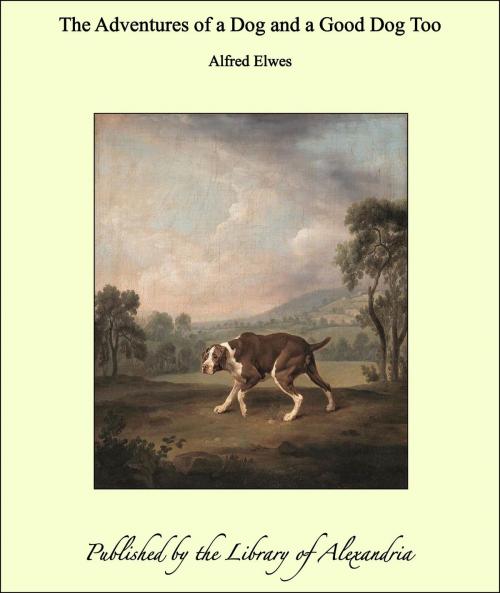The Adventures of a Dog and a Good Dog Too
Nonfiction, Religion & Spirituality, New Age, History, Fiction & Literature| Author: | Alfred Elwes | ISBN: | 9781465555847 |
| Publisher: | Library of Alexandria | Publication: | July 29, 2009 |
| Imprint: | Library of Alexandria | Language: | English |
| Author: | Alfred Elwes |
| ISBN: | 9781465555847 |
| Publisher: | Library of Alexandria |
| Publication: | July 29, 2009 |
| Imprint: | Library of Alexandria |
| Language: | English |
I love dogs. Who does not? It is a natural feeling to love those who love us; and dogs were always fond of me. Thousands can say the same; and I shall therefore find plenty of sympathy while unfolding my dog's tale. This attachment of mine to the canine family in general, and their affection towards myself, have induced me, like the Vizier in the "Arabian Nights," of happy memory, to devote some time to the study of their language. Its idiom is not so difficult as many would suppose. There is a simplicity about it that often shames the dialects of man; which have been so altered and refined that we discover people often saying one thing when they mean exactly the reverse. Nothing of the sort is visible in the great canine tongue. Whether the tone in which it is uttered be gruff or polished, sharp or insinuating, it is at least sincere. Mankind would often be puzzled how to use it. Like many others, its meaning is assisted by gestures of the body, and, above all, by the expression of the eye. If ever language had its seat in that organ, as phrenologists pretend, it lies in the eye of the dog. Yet, a good portion finds its way to his tail. The motion of that eloquent member is full of meaning. There is the slow wag of anger; the gentle wag of contentment; the brisker wag of joy: and what can be more mutely expressive than the limp states of sorrow, humility, and fear? If the tongue of the dog present such distinctive traits, the qualities of the animal himself are not less striking. Although the dispositions of dogs are as various as their forms—although education, connections, the society they keep, have all their influence—to the credit of their name be it said, a dog never sullies his mouth with an untruth. His emotions of pleasure are genuine, never forced. His grief is not the semblance of woe, but comes from the heart. His devotion is unmixed with other feelings. It is single, unselfish, profound. Prosperity affects it not; adversity cannot make it swerve. Ingratitude, that saddest of human vices, is unknown to the dog. He does not forget past favours, but, when attached by benefits received, his love endures through life. But I shall have never done with reciting the praises of this noble animal; the subject is inexhaustible. My purpose now has narrower limits
I love dogs. Who does not? It is a natural feeling to love those who love us; and dogs were always fond of me. Thousands can say the same; and I shall therefore find plenty of sympathy while unfolding my dog's tale. This attachment of mine to the canine family in general, and their affection towards myself, have induced me, like the Vizier in the "Arabian Nights," of happy memory, to devote some time to the study of their language. Its idiom is not so difficult as many would suppose. There is a simplicity about it that often shames the dialects of man; which have been so altered and refined that we discover people often saying one thing when they mean exactly the reverse. Nothing of the sort is visible in the great canine tongue. Whether the tone in which it is uttered be gruff or polished, sharp or insinuating, it is at least sincere. Mankind would often be puzzled how to use it. Like many others, its meaning is assisted by gestures of the body, and, above all, by the expression of the eye. If ever language had its seat in that organ, as phrenologists pretend, it lies in the eye of the dog. Yet, a good portion finds its way to his tail. The motion of that eloquent member is full of meaning. There is the slow wag of anger; the gentle wag of contentment; the brisker wag of joy: and what can be more mutely expressive than the limp states of sorrow, humility, and fear? If the tongue of the dog present such distinctive traits, the qualities of the animal himself are not less striking. Although the dispositions of dogs are as various as their forms—although education, connections, the society they keep, have all their influence—to the credit of their name be it said, a dog never sullies his mouth with an untruth. His emotions of pleasure are genuine, never forced. His grief is not the semblance of woe, but comes from the heart. His devotion is unmixed with other feelings. It is single, unselfish, profound. Prosperity affects it not; adversity cannot make it swerve. Ingratitude, that saddest of human vices, is unknown to the dog. He does not forget past favours, but, when attached by benefits received, his love endures through life. But I shall have never done with reciting the praises of this noble animal; the subject is inexhaustible. My purpose now has narrower limits















